If you’re seeking pressure washer reviews for both domestic and commercial use, look no further than PressureWasherToday.com. This website serves as a comprehensive resource for unbiased, in-depth product reviews, buying guides, and valuable user tips and tricks.
Whether you’re in need of a pressure washer for residential pressure washing tasks or require one for commercial applications such as pressure washing or soft washing, PressureWasherToday.com has you covered.
Pressure Washers Comparison
We select best-selling pressure washers from the Amazon marketplace and publish a review on each product after doing extensive research of product features, technology and other issues.
We have also prepared a comparison chart which will help you choose the right one for your needs.
| Product Name | AR Blue Clean AR118 | AR Blue Clean AR383 | Simpson 3125 | Sun Joe SPX3000 | Maxus MX5222 |
|---|---|---|---|---|---|
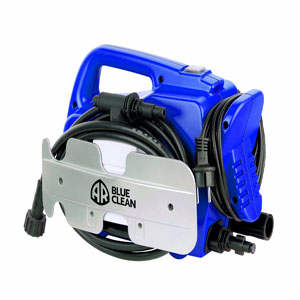 | 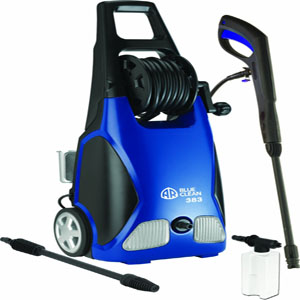 |  | 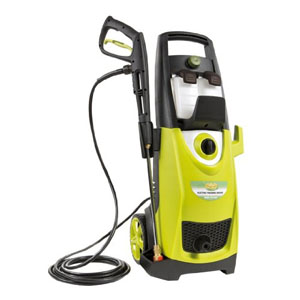 | 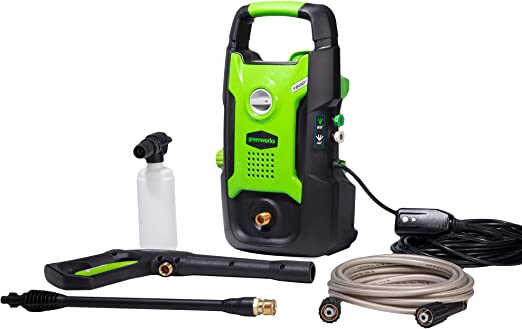 |
|
| PSI | 1500 | 1,900 | 3100 | 2030 | 1600 |
| GPM | 1.50 | 1.50 | 2.5 | 1.76 | 1.2 |
| Cleaning Units | 2250 | 2850 | 7750 | 3572 | 6000 |
| Pump | Three Axial Piston Wobble Plate | Annovi Reverberi Triplex 3 axial-piston | Honda GCV OHC | TSS Trigger Pump | Pump |
| Power Supply | Electric | Electric | Gas | Electric | AC |
| Hose Length | 20 feet | 20 feet | 25 feet | 20 feet | 20 feet |
| Spray | Adjustable Nozzle | Adjustable Head with Turbo Nozzle | Pro-style Wand with 5 Stainless Steel | Trigger Gun Wand Holder | Quick Connect Spray Gun |
| Ratings (Out of Five) | 4.2+/- | 4.1+/- | 4.2+/- | 4.4+/- | 4.3+/- |
| Buy Now | Buy Now | Buy Now | Buy Now | Buy Now |
Quick Navigation
Complete Guide to Buying a Power Washer
Knowing how to buy a pressure washer takes some preparation so that you can make the right choice. Having a buying guide at your side ensures that you have all of the information necessary to make an informed decision.
There is a lot to learn about pressure washers before entering the buying phase. It is critical that you have this information and understand it fully before you head to the store to see what it available.
1. Basic Power Washer Terminology
When you head to the store to purchase a power washer, there are various words and phrases you need to know to ensure that you choose the right one. This is the first thing that you need to know before moving onto learning more about buying this type of equipment.
Knowing what these words and phrases mean allows you to easily understand the information necessary to make an informed purchase. The following chart describes the terms you need to know in easy-to-understand language so that you can quickly evaluate the power washers you have to choose from.
| Term | Definition |
|---|---|
| Chemical Injector | This power washer component makes it easier to clean with this type of device by pushing chemicals into the stream of water. |
| Gallons Per Minute (GPM) | This is a way to describe how much water goes through the pump. Faster cleaning comes with a higher GPM. |
| Pounds Per Square Inch (PSI) | This describes how much pressure is sprayed onto a surface. |
| Pressure Gauge | This is a gauge on the unit that shows the peak pressure and working pressure. |
| Spray Nozzle | This nozzle goes on the tip of the hose and it is interchangeable. |
| Wand | This allows water to extend from the gun. |
| Work (HP) | This describes how much power is behind the water that comes out. |
| RPM | Shows the revolutions that the engine takes in a single minute. |
| Temperature | Every power washer has a temperature range that ensures safe use. |
| Cleaning Units | Cleaning power of a pressure washer. |
2. Details of Best Pressure Washer Reviews
Please, read our more detail pressure washer reviews by clicking on the each product name on the above table.
This graphic explains what sort of PSI and GPM you will need for different jobs:

3. Types of Pressure Washers
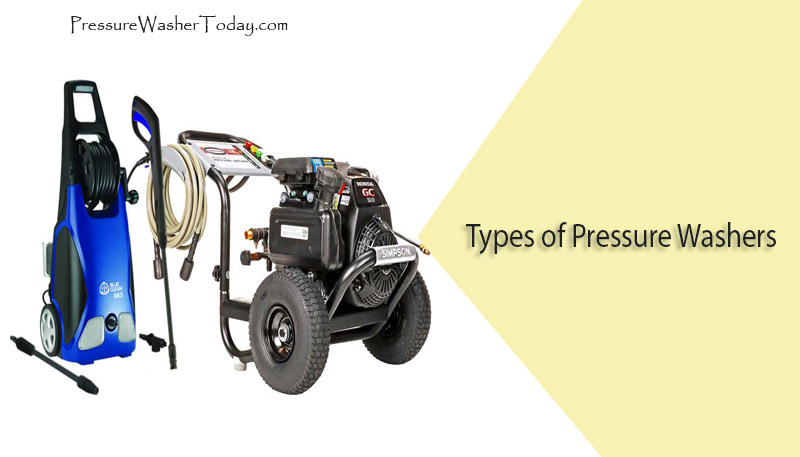
When you are exploring the pressure washers on the market, you will find that they run on either electricity or gas. An electric power washer is best for light-duty, such as cleaning an outdoor grill, a personal vehicle or the floor of your garage. They typically run at 1,300 to 1,400 psi.
These are typically lighter, more portable and quieter than a gas-powered pressure washer. These must be connected to a power outlet that contains a ground fault circuit interrupter to prevent electrocution. A 12 to 14 gauge extension cord is necessary for safe use.
Gas-powered pressure washers are what you want for tougher and larger cleaning jobs. It delivers a higher stream of water pressure with a psi rating that can exceed 3,000.
You will use more water with this type of power washer, but it is more effective. This type is used for things like removing deep stains on wooden decks, preparing the siding on the house for painting or for deep-cleaning your concrete. When you rent a power washer, you are most likely to find a range of gas-powered options.
In most cases, you will find a gas power washer because these are more common and there are more of them on the market. They also tend to be more diverse and have a greater range of power to ensure that they can clean a number of different surfaces.
However, if you want a simpler unit for general home use, you should take the time to look at the available electric power washers. These tend to be simpler when it comes to both use and maintenance.
These are ideal for those who are not familiar with using this type of unit at home due to their greater simplicity.
4. Pressure Washer Features to Consider
- High-pressure hose: These put out more cleaning power. They typically extend to approximately 25 feet, allowing you to easily move around while you clean.
- Nozzles and tips: Most consumer pressure washers have a single nozzle or tip that you can adjust. However, there are various options allowing you to use a nozzle or tip that is focused on the job at hand.
- Detergent tank: This is where you put approved cleaners and chemicals to use during pressure washer cleansing.
- Sturdy tires: You will need to move your pressure washer around, so you need tires that allow for easy movement and transport.
- Accessory storage: Many pressure washers have several accessories that you can remove and switch between.
- Water temperature: Some jobs require a certain temperature of water and you want to make sure that your chosen pressure washer can provide it.
- Telescoping handles: This allows you to adjust the length of the handle to ensure more efficient use.
- Quick-connect capability: This ensures that you are able to easily switch between various components so that you can get the job done as quickly as possible and without constant breaks.
There are also a number of accessories to learn more about. These work to make using a power washer easier. Certain accessories also help you with certain types of cleaning, such as scrubbing away tough stains or ensuring that your power washer is able to reach things like the second story of your home.
These accessories include:
- Brushes: Sometimes you need a brush to get some scrubbing power to ensure effective cleaning.
- Angled wand: This is helpful for jobs like gutters.
- Chemicals: These work for specific cleaning jobs.
- Extensions: These allow you to clean higher surfaces.
- Surface cleaners: These are ideal for sidewalks and driveways.
5. How do Pressure Washers Work?
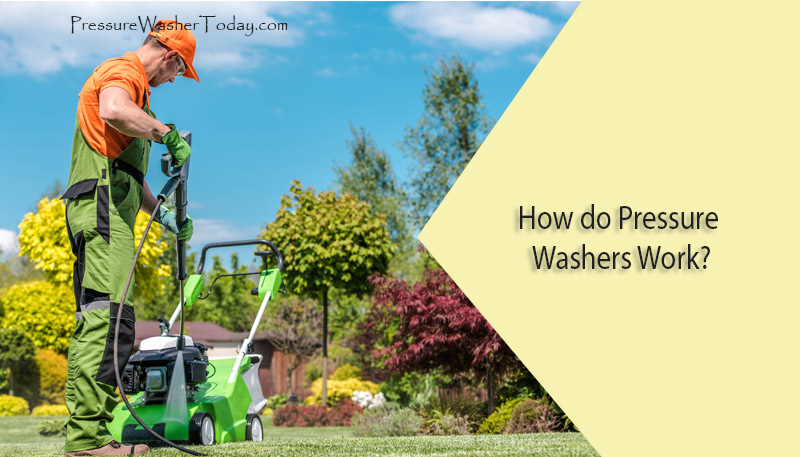
Things get messy, but having a pressure washer on hand ensures that you are able to clean things that traditional soap and water cannot handle. A pressure washer is made up of an air compressor and a garden hose when you are looking at the simplest of structural definitions.
The following provides a basic explanation of how this type of equipment works:
- There is a container or bottle that holds detergent or chemicals and these flow through the hose.
- Cold water flows through another hose and it is filtered. The water comes from a type of faucet, such as an outdoor garden hose faucet.
- A diesel engine or an electric motor works to power the power washer.
- A motor or an engine work to power a water pump. This component works to draw in both water and detergent or chemicals. It mixes both of these together. It also usually heats the water to approximately 125 to 155 degrees Fahrenheit. Since the unit will heat the water, you must only use cold water with a power washer.
- The combination of water and a detergent or a chemical come out of a high-pressure exit hose and any attached nozzle or tip. This helps to reduce water waste by up to 80 percent compared to a traditional water hose.
The insides of the power washer provide more insight to how this type of equipment works. Each has a specific function and must work properly or else you will notice problems with your pressure washer’s performance and overall operation.
The following internal components are in a pressure washer and they work in the following ways:
- There is an external housing that contains the components and helps to protect them from the outside environment.
- This type of equipment contains an electric motor.
- To prevent all water from getting into the unit’s motor, there is a type of insulating plastic foil that adds an extra layer of protection.
- The motor contains a central shaft that spins at a high speed. This is what ensures that the water pump is able to work efficiently.
- Another component is the reciprocating water pump. To make the water into a high-pressure jet, the pump has to reciprocate. Inside a pressure washer, you will find a number of pump units.
- The pump piston is a type of chamber that ensures that the water is able to get to a high pressure.
- The water pipe is the part of the unit where water is pumped out after it is sucked in from the faucet that you are using.
6. How to Use a Pressure Washer
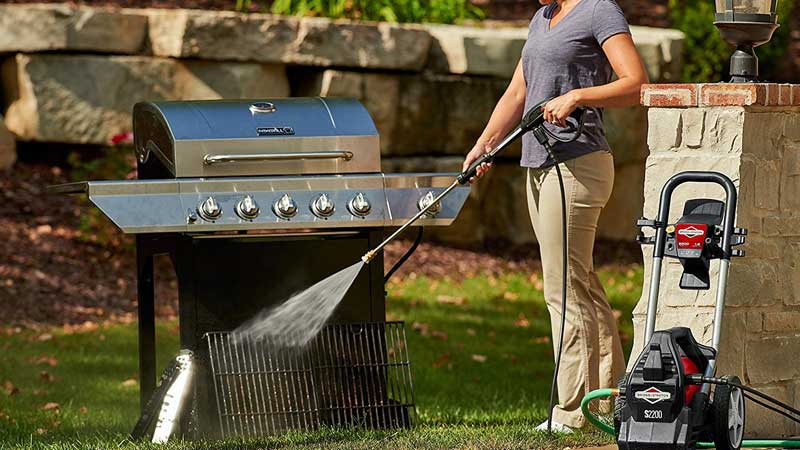
For most homeowners, a pressure washer that runs on 1,300 to 3,000 psi is going to be the best option. This allows you to tackle pretty much any job you need to clean in and around your home.
You will want to refer to the unit’s owner’s manual to get the exact information necessary to safely and efficiently use your chosen power washer. In general, you will use the following steps:
- Properly assemble all of the pieces and parts of your pressure washer.
- Connect your unit to an approved water source.
- Insert any necessary cleaners or chemicals that you need for the job.
- Double check to ensure that everything is properly installed.
- Use the pressure washer, paying attention to the gauges to ensure it is operating efficiently.
There are a number of tips and bits of information that you should know to ensure a positive cleaning experience. Keep the following in mind when you are using your pressure washer for various cleaning projects:
- Before you start cleaning, wet the whole surface to prevent streaking.
- It is best to start further away from the surface and slowly move closer until you achieve your desired results. This prevents using too much pressure on any surface.
- To ensure an even and smooth cleaning experiencing, never get directly on the surface that you are trying to clean. If you keep a distance, this will improve the cleaning experience.
- It is best to put about five feet between the end of the nozzle and the surface that you are cleaning.
- Make sure to always move the nozzle steadily and do not use fast or erratic movements. A smooth and steady movement ensures that you get consistent results with cleaning.
- Never hold the nozzle in the same spot for more than two to three seconds. This results in the final cleaning results being uneven and inconsistent.
- Use a cleaning detergent when you are trying to clean a surface with heavy staining. The right detergent ensures that you are able to deeply penetrate the staining. These work at higher pressures. Never use a chemical at higher pressures because this can result in not enough of the chemical penetrating the stain because it will just splash off the surface. The detergent is more likely to stay in place and do its job.
- Use a narrow spray when you are trying to clean surfaces that are more difficult to reach. You can also extend the telescoping handle to ensure that you get enough power in the water spray on surfaces that are at a distance.
- Always work on small sections at a time. This ensures consistent cleaning throughout the entire project. For example, if you are cleaning a deck, only work on two boards at a time. Once you full clean these, move onto another set of two boards and clean these. You should do the same for all other surfaces.
- Make sure that you never walk away from your power washer during operation. The pressurized water that comes out of the gun component can cause serious injuries in the form of cuts or penetrating the skin.
- Make sure that you always protect your eyes and ears when you are using a pressure washer. It is especially important to wear the right eye protection when you are using a detergent or a chemical because there is always a chance that they can splash back into your eyes and cause irritation or more serious damage.
- Always make sure that you are using the correct nozzle. If you use the wrong nozzle, you can cause significant damage to the surface that you are cleaning.
- Make sure that you have solid footing and stable balance when you are using a pressure washer. Never stand on something that you could fall off of. The pressure of the water may cause you to fall backward.
- Never point the gun component at people, plants or animals. It can cause significant injuries or damage. Due to the power of the water, you also must never point it at things like screens and windows.
7. Pressure Washer Uses and Benefits
There are a number of uses and benefits associated with a pressure washer. When you have this type of equipment at home, you are able to get a lot more done to maintain various things around your home.
The following are common benefits that come with owning your own pressure washer:
- You save money by doing your own cleaning at home. You will not have to hire a specialist to do things like clean your deck and driveway.
- You will protect your investments. Keeping your home, yard and vehicles clean is an easy way to help ensure that they maintain their good condition for a long period of time.
- You are going to save water. While you are using water as part of the cleaning process, the fact that it is pressurized actually saves water.
Another benefit is that a single pressure washer can be used to clean a number of things. There are dozens of uses for power washers, depending on whether you are using them at home or in a commercial or industrial setting.
However, most people want to learn more about home use since this type of equipment is becoming increasingly popular among homeowners. The following are what the majority of people use a consumer pressure washer for:
- To clean various types of fending around the home
- To tackle dirt and grime on exterior brick or siding
- To keep a garage door clean
- To clean the outdoor grill and keep it ready for grilling
- To remove wasp nests and spider webs from a distance to ensure safety during removal
- To remove dirt, debris and stains from the driveway
- To keep the deck and patio clean
- To keep your outdoor and patio furniture clean and in good shape
- To fully clean your vehicles, boats and motorcycles
- To bathe your lawnmower to reduce the risk of debris buildup
- To care for all of your lawn equipment
- To keep your trash cans clean so that they do not develop a rancid odor
8. Capabilities of a Pressure Washer
Knowing what you can clean with a pressure washer is critical in ensuring that you choose the best one. Know the information below so that you choose a pressure washer with the right range of capabilities:
- Light-duty pressure washer: These range from about 1,500 to 1,900 psi. This is best for cleaning things like sidewalks, patio furniture and stairs.
- Heavy-duty pressure washer: These range from about 2,900 to 3,200 psi. These are ideal for things like sidewalks, garage floors and driveways.
- Medium-duty pressure washer: These range from about 2,000 to 2,800 psi. These work for fences, patios, driveways, decks and garage floors.
- Extra-duty pressure washer: These are 3,300 psi and greater. These are best for the toughest jobs, such as industrial cleaning.
To choose the right pressure washer, consider when you need to use it for. If you are going to use it for various cleaning projects, make sure that you choose one with the right range of psi to do this.
In general, the tougher the job, the higher the psi you need to get with a pressure washer. If you get one with a good psi range, you will be able to tackle all of the necessary jobs.
Write down the things you need to use a pressure washer to clean and then look at the various psi necessary for each job to pick the right pressure washer.
9. Picking Out the Best Nozzle for a Pressure Washer
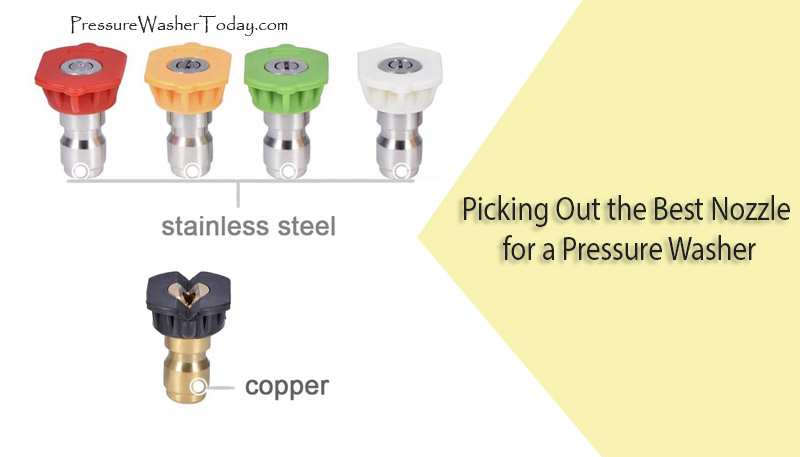
When you buy a pressure washer with under 2,400 psi, it generally comes with one nozzle that you can adjust for the cleaning job. This nozzle typically works with a fan pattern of zero to 60 degrees.
Some models have a standard nozzle that is either a turbo or a rotating so that the water stream is spun for more effective cleaning.
If you are using a heavier-duty piece of equipment, there are typically five nozzle tip options that are color-coded. The colors work in the following ways:
- Red nozzle tip: This is ideal for a water stream that is small and very concentrated. Removing debris and tough stains from metal and concrete often warrants this nozzle tip. Never use this in siding or wood or it could cause damage.
- Black nozzle tip: This is used when you need low pressure and are using detergent.
- Green nozzle tip: This is best to sweep away mud, leaves and dirt. It sprays at 25 degrees.
- Yellow nozzle tip: This works when you are preparing a surface. It sprays at 15 degrees to remove mildew, dirt or paint. You can use this nozzle tip on the majority of surfaces.
- White nozzle tip: This tip works at 40 degrees. It is best when you need to clean surfaces that are more delicate, such as home siding, stucco walls or glossy surfaces.
It is important to clean your nozzles regularly to keep your pressure washer working efficiently. If you do not maintain your pressure washer nozzles, you risk causing damage to your pressure washer.
Because of this, you must look at the nozzle before and after each use to ensure that it is fully clean and open. Use the following steps to ensure clean nozzles:
- Disconnect the gun and spray wand. Never clean a nozzle when these are connected.
- Use a small wire piece to clear the nozzle. A paperclip usually works well.
- Use water to flush backward into the nozzle.
- Reconnect the gun and the wand.
- Use the pressure washer for a minute or two to ensure that there is no partial or full clog remaining.
If the cleaning process fails, you should get a new nozzle since you cannot safely use a clogged nozzle on a pressure washer. You can buy the nozzles separately so that you only have to replace the ones that you need.
10. Making Sure to Choose the Proper PSI for the Job
You now have a good understanding of psi so it is time to put that knowledge to use so that you pick the right psi for what you need to clean. The following shows you the psi that you need to use to clean certain types of projects.
Use this as your guide to ensure that you buy a power washer that has the right PSI:
- If you are cleaning more delicate things, such as your personal vehicles, you want to use a psi of around 2,500
- If you are trying to clean wooden surfaces, such as your deck, you want to choose a psi of around 2,700
- If you are going to be cleaning types of masonry or concrete, you want a psi of around 3,000
- If you need a power washer for industrial applications or for something like removing graffiti, you want a psi of around 4,000
This, of course, does not cover every single application of a power washer. However, you can deduct from the information above approximately the amount of psi you will need for your cleaning projects.
It is important that you always have enough power without having too much. If you use too much power, you risk causing extensive damage to whatever object or surface you are trying to clean.
11. Exploring the Standard Electrical Ratings on a Power Washer
If you look at the owner’s manual, you will find the specific phase and voltage for the power washer that you are considering. The standard electrical ratings include:
- 110 to 120 volts
- 1 phase/208 volts
- 1 phase/230 volts
- 3 phase/230 volts
- 3 phase/460 volts
Pressure Washer Comparisons
There are a few ways to compare the three grades of power washers. You should understand this before making a purchase so that you have an idea of the type that you need to complete the job.
Without the right grade, you will not be able to tackle all of the necessary cleaning tasks. Consider the following four factors and how they relate to the three power washer grades.
| Pressure Washers | Consumer Grade | Semi-Pro Grade | Commercial Grade |
|---|---|---|---|
| GPM | 1.0 to 4.9 | 1.0 to 4.9 | 1.0 to 7.0 |
| Cleaning Units | 1,560 to 16,000 | 2,400 to 16,800 | 3,000 to 16,800 |
| PSI | 1,350 to 4,900 | 1,000 to 4,900 | 1,000 to 5,000 |
| Water Temperature | Cold | Cold | Cold/Hot/Warm |
Pressure Washer Maintenance
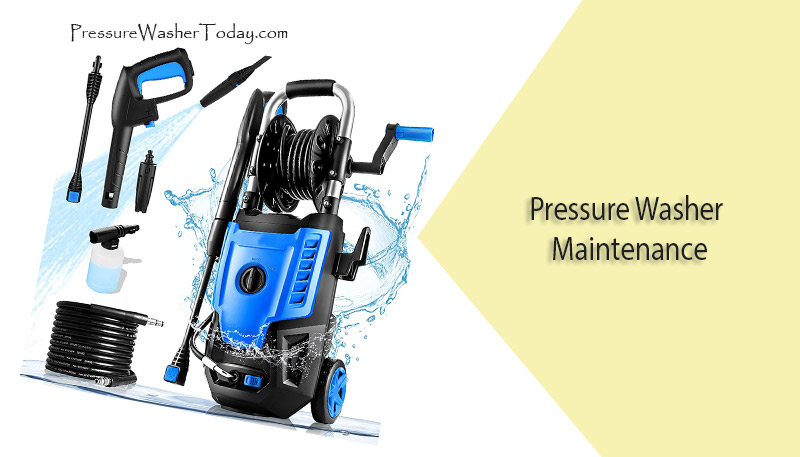
One essential part of owning a pressure washer is knowing how to keep it maintained. You want to inspect all of the various components at least once a year to ensure that all of the pieces and parts are well-maintained.
If something is not functioning at an optimal level, make sure to either clean it properly or replace it. If you continue to use your pressure washer when any of the parts require maintenance or replacing, you risk causing damage to your entire unit.
Another important part of maintenance is properly winterizing your power washer before storing it in the cold months. Make sure to use the proper antifreeze to prevent the fluids from freezing when it gets cold.
You should remove the gas, remove the hoses and make sure that the intake is properly sealed using duct tape.
Shop Pressure Washer Maintenance Kits
Common Pressure Washer Problems to Know About
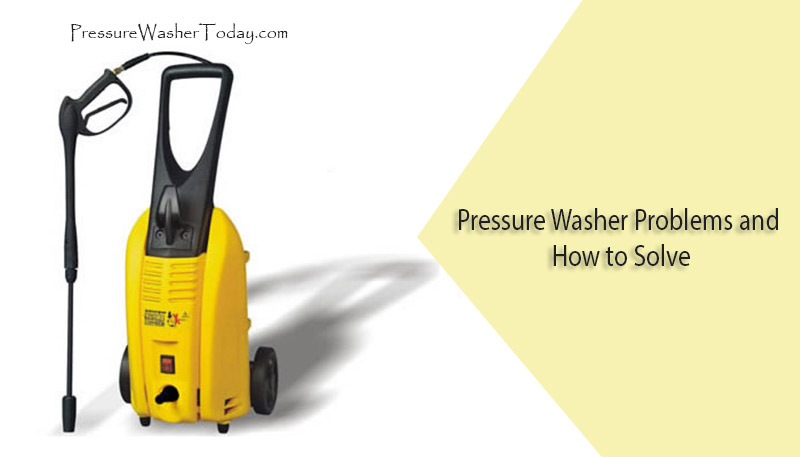
When you own a pressure washer, you want to know what can go wrong so that you can anticipate it.
While there are a number of problems that you may encounter, there are three primary issues that are the most common that every power washer owner must know about.
The three following issues are common problems that can occur:
- There is erratic pressure with your power washer.
- The pressure washer is experiencing low water volume or loss of pressure.
- There is no pressure coming from the pump on your unit.
Pressure Washer Repair and Troubleshooting
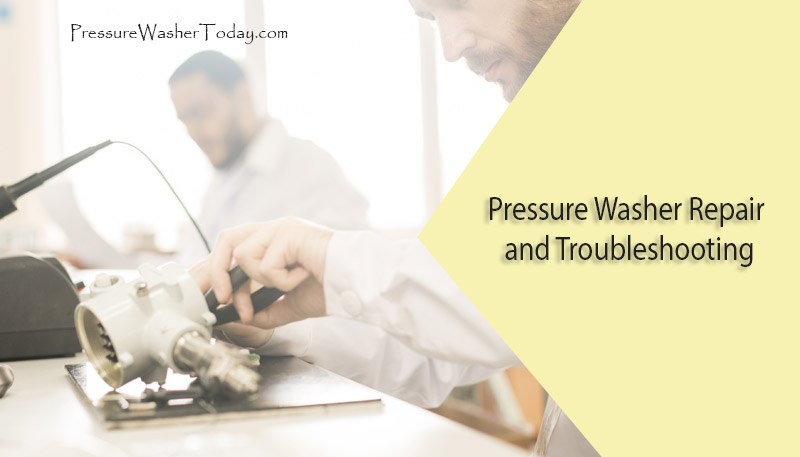
When there is a problem with your power washer, you want to be able to troubleshoot it efficiently.
If you are able to properly troubleshoot your power washer, you will be able to save some money because you can take care of the problem without having to spend money on a professional to perform the maintenance.
Use the following questions and answers as your guide when you are having a problem:
- Is the engine at its fullest speed?: If not, simply switch the throttle control to the ‘Fast’ speed.
- Is there a clog, damage or block affecting the filter screen or water inlet?: Disconnect the hose and inlet, clean the filter screen and inlet. If damage is the problem, replace the screen.
- Is there a leak in your spray gun?: You will have to replace the spray gun.
- Is the temperature of the water supply exceeding 100 degrees Fahrenheit?: Make sure that the water supply you use is cooler.
- Is the nozzle pressure low?: Look at the nozzle pressure and switch it to a higher pressure.
- Is there a leak in the high pressure hose?: Replace the o-rings. This typically occurs when they are damaged.
- Is there an obstruction in the nozzle orifice?: Turn the engine off, purge pump air, remove the spray tip and orifice, clean both and replace.
- Is there an issue with the flow rate or water supply pressure?: Use the gauge to test the pressure.
- Is there a low oil level in the pump?: Add more oil to reach the desired level.
- Is the pump faulty?: Look for issues like clogs and relieve the issue. In some cases, the pump needs to be replaced.
Where Should I Store a Pressure Washer?
The storage space should be well-ventilated, dry and clean. Make sure that there are no open sparks or flames near the storage space.
Winterize your pressure washer if you plan to store it somewhere that gets very cold in the winter, such as an unheated garage or shed. Remove all of the engine gasoline if you plan to store it in your basement. This ensures safety just in case a fire occurs.
When you buy a pressure washer, you can see that there are many factors to consider. You must fully evaluate your needs and then look at the pressure washers available to determine which one fits the bill.
There are dozens of power washers on the market, so it is important that you take the time to see what is available and what they have to offer. Since having this piece of equipment will save you money and time, it is critical to choose the one model that best fits your cleaning needs.
So if you’re a homeowner with less time and a fanatical desire from cleanliness, this is the product for you. Look into the various kinds of washers to see which one will best suit your house cleaning needs.
This is truly a revolution in cleaning technology, something that makes our lives easier and our homes brighter. Welcome to the wonderful world of Pressure Washers!
Frequently Asked Questions
When you are in the market to buy a pressure washer, you likely have a number of questions that you need to answer before making a good decision.
These questions help you narrow down the list of pressure washers you are considering buying to make the decision easier.
The following questions are those that people commonly have when they are in the market for a new pressure washer. You can take these with you when you are shopping to get a better sense of what you need.
